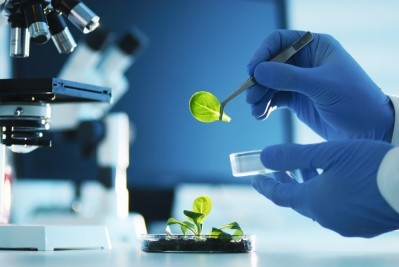UK feed trade group hails potential of plant gene editing law

Proponents say the new legislation will unlock key technologies to improve food security, reduce pesticide use, and enhance climate-resilience in crops.
Opponents argue the regulation only benefits the biotech industry.
Regulatory divergence
This legislation applies to England only, as Scottish, and Welsh devolved governments do not currently support it.
And that regulatory divergence could be a challenge. Though, food produced using precision breeding techniques in England can be legally marketed in Scotland and Wales under the UK Internal Market Act.
Home-grown protein for animal feed
The UK's agri-supply trade association, the Agricultural Industries Confederation (AIC), says the legislation has the potential to bring significant benefits to the environment, producers, the agri-food supply chain, and consumers.
Crops bred using the genetic technology can be made to better withstand the effects of climate change, such as flooding or drought, as well as having a greater resistance to pests and disease, said the body.
Gene editing could help with producing more home-grown protein for animal feed, thereby cutting the UK's dependence on imports, it maintains.
AIC chief executive, Robert Sheasby, said: "This is a significant moment for UK food production. With growing challenges facing agriculture and the environment, AIC is clear that more efficient plant breeding technologies could play an important future role in feeding the nation.
"While precision breeding is by no means the sole answer to the challenges of climate change and straining food systems, the potential that could be achieved in a variety of agricultural sectors cannot be overlooked.
"Precision breeding is an opportunity afforded by the UK's EU exit to unlock agri-food innovation, and AIC has worked closely with the government as this legislation was developed to ensure it is workable in practice."
Plants developed with gene editing techniques involve genetic changes that would have occurred naturally or through traditional breeding methods, but typically take many years to achieve, said the AIC. "This differs from genetic modification (GM), which produces organisms containing additional genes."
England aligns with other countries
Dr Penny Hundleby, senior scientist in the crop transformation team at the John Innes Centre said:
“The passing of the Bill is a positive step forward for research and innovation and will align England’s regulatory path with other countries. We have used precision breeding techniques for the last 10 years as a research tool to further our understanding of plants, determining which genes underpin which characteristics. This new Act means that we will start to see the outcomes of our research being used to develop crops which are more resilient, and foods that are more nutritious.”
England joins countries such as Argentina, the US, Australia, and Japan that have already enacted similar legislation to regulate precision bred plants, while the EU is currently debating legislation on precision breeding.
Technology 'over-promises'
However, Pat Thomas, director of Beyond GM, believes the new legislation has a single beneficiary – the biotech industry. “It removes meaningful regulatory control – including safety assessments, consumer labelling and monitoring – from a staggering range of genetically modified plants and animals in our food system and the wider environment. It allows biotech developers to self-certify that their engineered organisms are safe and beneficial and imposes no penalties if that turns out to be untrue.
“It is absolutely right to question the motives and the consequences of any piece of legislation that allows a large and well-funded industry to fly so far below the regulatory radar.”
She said the political context of the bill is as important as the scientific context.
“The UK government has shown complete disdain for science by inventing its own category of GMOs – the precision bred organism (PBO). This PBO is a special Brexit GMO that, we are told, will transport the UK to the sunny uplands of global tech dominance while at the same time fixing our food system and wider environmental problems. The catch is that gene editing technology, which has been around for more than a decade, consistently over-promises and under-delivers and that makes it an economic, food system and environmental failure. We should be focusing on solutions that work.”
What does the Act have the powers to do?
It can:
- Remove plants and animals produced through precision breeding technologies from regulatory requirements applicable in England to the environmental release and marketing of GMOs.
- Introduce two notification systems; one for precision bred organisms used for research purposes and the other for marketing purposes.
- Establish a proportionate regulatory system for precision bred animals to ensure animal welfare is safeguarded. Changes to the regulations for animals won't be introduced until this system is in place.
- Establish a new science-based authorization process for food and feed products derived from using precision bred plants and animals.













